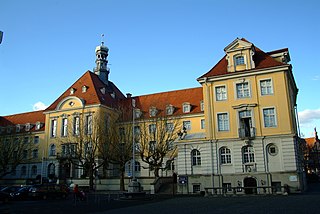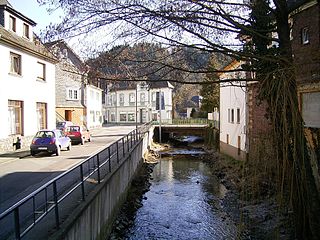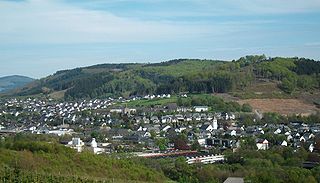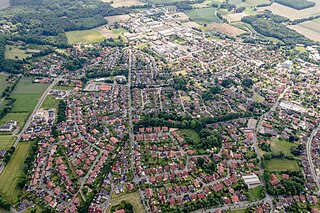
North Rhine-Westphalia or North-Rhine/Westphalia, commonly shortened to NRW, is a state (Land) in Western Germany. With more than 18 million inhabitants, it is the most populous state in Germany. Apart from the city-states, it is also the most densely populated state in Germany. Covering an area of 34,084 square kilometres (13,160 sq mi), it is the fourth-largest German state by size.

Münster is an independent city in North Rhine-Westphalia, Germany. It is in the northern part of the state and is considered to be the cultural centre of the Westphalia region. It is also a state district capital. Münster was the location of the Anabaptist rebellion during the Protestant Reformation and the site of the signing of the Treaty of Westphalia ending the Thirty Years' War in 1648. Today, it is known as the bicycle capital of Germany.

Lüdenscheid is a city in the Märkischer Kreis district, in North Rhine-Westphalia, Germany. It is located in the Sauerland region.

Herford is a Kreis (district) in the northeastern part of North Rhine-Westphalia, Germany. Neighboring districts are Minden-Lübbecke, Lippe, the urban district of Bielefeld and the districts of Gütersloh and Osnabrück.

Herford is a town in North Rhine-Westphalia, Germany, located in the lowlands between the hill chains of the Wiehen Hills and the Teutoburg Forest. It is the capital of the district of Herford.

Borken is a town and the capital of the district of the same name, in North Rhine-Westphalia, Germany.

Dinslaken is a town in the district of Wesel, in North Rhine-Westphalia, Germany. It is known for its harness racing track, its now closed coal mine in Lohberg and its wealthy neighborhoods Hiesfeld and Eppinghoven.

Paderborn is a city in eastern North Rhine-Westphalia, Germany, capital of the Paderborn district. The name of the city derives from the river Pader and Born, an old German term for the source of a river. The river Pader originates in more than 200 springs near Paderborn Cathedral, where St. Liborius is buried.

Extertal is a municipality in the Lippe district of North Rhine-Westphalia, Germany, with c. 11,500 inhabitants (2013).

Bad Salzuflen is a town and thermal spa resort in the Lippe district of North Rhine-Westphalia, Germany. At the end of 2013, it had 52,121 inhabitants.

Höxter is a town in eastern North Rhine-Westphalia, Germany on the left bank of the river Weser, 52 km north of Kassel in the centre of the Weser Uplands. The main town's population is around 15,000, and with outlying centres, about 30,000. It is the seat of the Höxter district. Historical place names of Höxter are Hoxer and Huxaria.

Euskirchen is a town in North Rhine-Westphalia, Germany, capital of the district Euskirchen. While Euskirchen resembles a modern shopping town, it also has a history dating back over 700 years, having been granted town status in 1302. As of December 2007, it had a population of 55,446. Its local football club is called TSC Euskirchen.

Reichshof is a North Rhine-Westphalian municipality in the Oberbergischer Kreis in Germany, about 40 km east of Cologne. It is a health resort, known for its good climate. The municipality consists of 106 villages and hamlets. The most important villages are Denklingen, Eckenhagen (1900), Brüchermühle (1700) and Wildbergerhütte (1600).

Morsbach is a municipality in Oberbergischer Kreis, a district in North Rhine-Westphalia near the border of Rhineland-Palatinate in Germany. In 2015, Morsbach's population was 10,600. The central village, also named Morsbach, has a population of 3,400. With a number of buildings dating back to the 12th century, it is a popular spot for hikers and other nature lovers.

Kaarst is a town in Germany. It lies in the district of Rhein-Kreis Neuss in North Rhine-Westphalia. It is 5 km west of Neuss and 12 km east of Mönchengladbach.

Wettringen is a village and a municipality in the district of Steinfurt, in North Rhine-Westphalia, Germany.

Spenge is a town in the district of Herford, in North Rhine-Westphalia, Germany

Bad Lippspringe is a town in the district of Paderborn, in North Rhine-Westphalia, Germany.

Bestwig is a municipality in the Hochsauerland district, in North Rhine-Westphalia, Germany.

Ostbevern is a municipality in the district of Warendorf, in North Rhine-Westphalia, Germany.

























